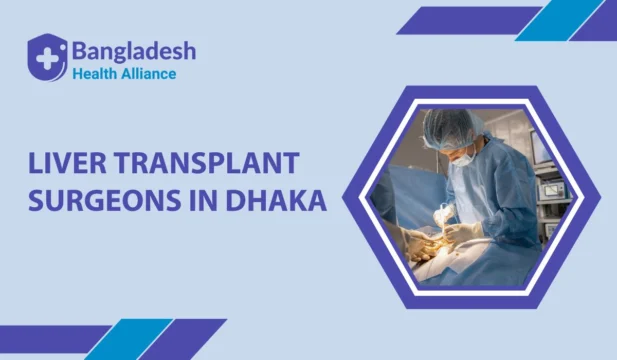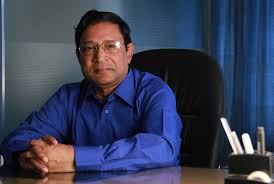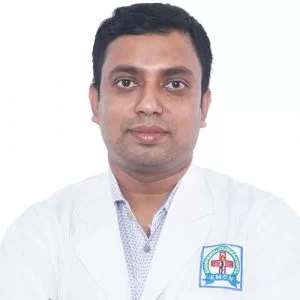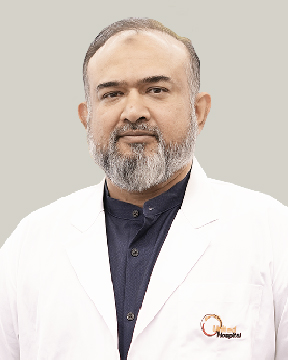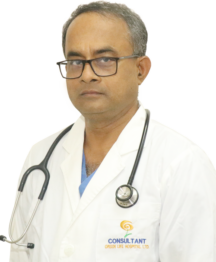Liver transplantation is a life-saving procedure for individuals suffering from severe liver conditions, such as cirrhosis, liver cancer, or acute liver failure. With liver diseases being a significant health concern in Bangladesh, the need for specialized care and skilled surgeons in Dhaka has increased dramatically. Over the years, Dhaka has emerged as a hub for liver transplant surgeries, with several top-notch hospitals and highly experienced surgeons providing world-class care. This guide by Bangladesh Health Alliance offers an in-depth look into liver transplant services in Dhaka, including the surgeons, hospitals, and all essential information you need to make an informed decision.
Best Liver Transplant Surgeons in Dhaka, Bangladesh
Prof. Mohammad Ali Liver Transplantation Specialist
Prof. Mohammad Ali is a pioneering Hepato-Biliary-Pancreatic surgeon and liver transplant specialist in Bangladesh. He holds the distinction of performing the first successful liver transplant in the country, making a significant contribution to the field of organ transplantation.
Specializations
- Hepato-Biliary-Pancreatic Surgery
- Liver Transplantation
Academic and Professional Qualifications
- MBBS, Sylhet M.A.G Osmani Medical College, with distinction and honors
- FCPS, Surgery, Bangladesh College of Physicians and Surgeons
- FRCS Ed, Surgery, Royal College of Surgeons of Edinburgh, UK
- Fellowship in Hepato-Biliary-Pancreatic Surgery and Liver Transplant, Queensland Liver Transplant Services, University of Queensland, Australia
- Training in Liver Transplantation, University of Tokyo and University of Kyoto, Japan
Professional Appointments
- Founder and Chairman, National Liver Foundation of Bangladesh (NLFB)
- Established the first department of Hepato-Biliary-Pancreatic Surgery in Bangladesh at BIRDEM General Hospital, Dhaka
Prof. Ali is a dedicated medical professional who has dedicated his life to improving the lives of patients with liver diseases. His pioneering work in liver transplantation and his commitment to hepatitis prevention and control have made a significant impact on the healthcare landscape in Bangladesh.
Book an Appointment
BRB Hospitals Ltd
- Location: 77/A East Rajabazar, West Panthapath, Dhaka 1215, Bangladesh.
- Visiting Day: Saturday, Monday & Wednesday
- Visiting Time: 5:00 PM to 9:00 PM
- Care Line: 10647
- Phone: 029140333, 9140346
- Mobile: 01753337093
- Email: mohammad.ali_bd@yahoo.com
National Liver Foundation of Bangladesh
- Location: 150, Green Road, Panthapath (2nd floor), Dhaka 1215,
Bangladesh. - Visiting Day: Sunday, Tuesday, and Thursday
- Visiting Time: 11:00 AM to 1:00 PM
- Phone: 0258157157
- Mobile: 01732999922
Prof. Dr. Md. Mohsen Chowdhury
Prof. Dr. Md. Mohsen Chowdhury is a distinguished figure in the field of liver transplant surgery in Bangladesh. He holds an MBBS, FCPS in Surgery, and is a Clinical Fellow of Hepato Biliary, Pancreatic Surgery & Liver Transplantation Division at the National University Hospital Singapore. Currently, he serves as the Chairman & Professor of the Department of Hepatobiliary & Pancreatic Surgery at Bangabandhu Sheikh Mujib Medical University (BSMMU). His vast knowledge and experience make him a trusted name in the field.
- Qualifications: MBBS, FCPS (Surgery), Clinical Fellow Hepato Biliary, Pancreatic Surgery & Liver Transplantation Division, National University Hospital Singapore
- Specialization: Hepato-biliary, Pancreatic, Liver Transplant & Laparoscopic Surgeon
- Position: Chairman & Professor, Department of Hepatobiliary & Pancreatic Surgery, Bangabandhu Sheikh Mujib Medical University (BSMMU)
- Chamber: Samorita Hospital Ltd., 89/1 Panthapath, Dhaka – 1215
- Visiting Hours: 4:00pm – 6:00pm
- Appointment: +8802481176189 Ext: 20501685450285, 01731468662
Associate Prof. Dr. Akhter Ahmed (Shuvo)
Also known as Shuvo, Associate Prof. Dr. Akhter Ahmed is a renowned liver transplant surgeon in Bangladesh. He has an MBBS, FCPS in Surgery, MS in Hepatobiliary Surgery, and is a Fellow of the American College of Surgeons (FACS). He also received specialized training in liver transplant surgery at RIMC, India. As an Associate Professor of Hepatobiliary Surgery at Shaheed Suhrawardy Medical College, Dhaka, Dr. Ahmed combines his vast knowledge with a deep sense of empathy for his patients.
- Qualifications: MBBS, FCPS (Surgery), MS (Hepatobiliary Surgery), FACS, Trained Liver Transplant Surgeon (RIMC, India)
- Specialization: General Surgery, Hepatobiliary Surgery and Liver Transplant Surgery Specialist
- Position: Associate Professor of Hepatobiliary Surgery, Shaheed Suhrawardy Medical College, Dhaka
- Chamber: Dhaka Central Liver Care, Dhaka Central International Medical College, Ring Road, Adabor, Dhaka Room No: 605, Phone: 02 9145808-9, Mob: 01746344179
Associate Prof. Dr. Mohammad Saief Uddin
Associate Prof. Dr. Mohammad Saief Uddin is a respected liver transplant surgeon who has made significant contributions to the field. He holds an MBBS, FCPS in Surgery, MRCS (Edin), MRCPS (Glasg), FRCS(Glasg), and is a Liver Transplant Fellow at Medanta-Delhi NCR. His specialization lies in Hepato-biliary, Pancreatic, Liver transplant, and Laparoscopic Surgery. He is an Associate Professor in the Department of Hepatobiliary, Pancreatic & Liver Transplant Surgery at Bangabandhu Sheikh Mujib Medical University (BSMMU).
- Qualifications: MBBS, FCPS (Surgery), MRCS (Edin), MRCPS (Glasg), FRCS(Glasg), Liver Transplant Fellow (Medanta-Delhi NCR)
- Specialization: Hepato-biliary, Pancreatic, Liver transplant & Laparoscopic Surgeon
- Position: Associate Professor, Department of Hepatobiliary, Pancreatic & Liver Transplant Surgery, Bangabandhu Sheikh Mujib Medical University (BSMMU)
- Chamber: Al Manar Hospital Ltd. Room no: 401, Satmosjhed Road, Mohammadpur (Near Mohammadpur new thana), Dhaka
- Visiting Hours: 6:00 pm – 8:30pm (Friday closed)
- Appointment: 01818311575 (Md. Wasim)
Dr. Hasim Rabbi – Liver transplant Surgeon
Dr. Hasim Rabbi is a promising liver transplant surgeon in Bangladesh. He holds an FCPS in Surgery, MRCS(Edin), and MRCPS(Glasgow), and specializes in Hepato-biliary, Pancreatic, Liver transplant Surgery. His dedication to his patients and commitment to staying abreast of the latest developments in his field make him a sought-after specialist.
- Qualifications: FCPS(Surgery), MRCS(Edin), MRCPS(Glasgow)
- Specialization: Hepato-biliary, Pancreatic, Liver transplant Surgeon
- Chamber: Popular Diagnostic Centre Ltd – Dhanmondi Branch, House #16, Road # 2, Dhanmondi R/A, Dhaka-1205, Bangladesh
- Visiting Hour: 5 pm- 8 pm(Saturday & Wednesday), 3 pm-6 pm(Other day)
- Phone: +8809613787801
Dr. Md. Asaduzzaman Nur – Liver Transplant and Hepatobiliary Surgeon
Dr. Md. Asaduzzaman Nur is a highly skilled liver transplant and hepatobiliary surgeon with extensive training and experience in laparoscopic surgery. As an Assistant Professor at Enam Medical College Hospital, he provides expert care in liver and biliary surgeries, focusing on minimally invasive techniques. His qualifications from prestigious institutions in Edinburgh and England reflect his commitment to excellence in the field of hepatobiliary surgery.
- Specialty: Hepatobiliary, Liver Transplant & Laparoscopic Surgeon
- Degrees: MBBS, MRCSEd (Edinburgh), MRCS (England), MS (Hepatobiliary Surgery)
- Designation: Assistant Professor
- Hospital: Enam Medical College Hospital
- Visiting Hours: Saturday to Thursday, 8:00 AM to 2:30 PM
- Room No.: 605, C-Block
Top Hospitals for Liver Transplant Surgery in Dhaka, Bangladesh
Bangabandhu Sheikh Mujib Medical University (BSMMU)
As a leading public university and hospital, BSMMU has been at the forefront of medical advancements in Bangladesh. It boasts a dedicated liver transplant unit with experienced surgeons and state-of-the-art facilities.
BIRDEM General Hospital & Ibrahim Cardiac Hospital & Research Institute (ICHRI)
Known for its expertise in cardiac care, BIRDEM has expanded its services to include liver transplantation. It offers comprehensive care for liver diseases and transplant procedures.
Sheikh Fazilatunnesa Mujib Memorial KPJ Specialized Hospital
Sheikh Fazilatunnesa Mujib Memorial KPJ Specialized Hospital a renowned hospital offering a wide range of specialized medical services, including liver transplantation. It combines modern technology with patient-centric care.
Evercare Hospital, Dhaka
Evercare Hospital is a leading private healthcare provider in Bangladesh, offering advanced liver transplant services. It emphasizes patient safety and comfort.
United Hospital Ltd, Dhaka
A well-established private hospital with a strong reputation for medical excellence. United Hospital offers comprehensive liver transplant care, supported by experienced specialists.
Enam Medical College Hospital
Enam Medical College Hospital has established a liver transplant program with a focus on providing accessible and affordable care to patients.
Overview of Liver Transplant Surgery
What is Liver Transplantation?
A liver transplant is a surgical procedure where a diseased liver is replaced with a healthy liver from a donor. The liver is responsible for critical functions such as detoxification, bile production, and metabolic regulation. When it fails, liver transplantation becomes a necessary intervention.
Types of Liver Transplantation:
- Living Donor Liver Transplantation (LDLT): A portion of the liver from a living donor, usually a relative, is transplanted into the patient. Both the donor’s and recipient’s livers regenerate over time.
- Deceased Donor Liver Transplantation (DDLT): A complete liver from a deceased donor is transplanted into the patient. This is more common but depends on donor availability.
Eligibility for Liver Transplant:
Patients undergo a rigorous evaluation to assess the severity of liver disease, overall health, and potential recovery. Factors like age, other health conditions, and infections play a crucial role in determining eligibility.
Challenges and Risks:
The complexity of liver transplantation introduces potential risks such as organ rejection, infection, and surgical complications. Finding a compatible donor is also a significant challenge in Bangladesh.
The Evolution of Liver Transplantation in Bangladesh
The journey of liver transplantation in Bangladesh began with the pioneering efforts of BIRDEM General Hospital, led by Prof. Mohammad Ali. After completing his fellowship in Hepato-Biliary-Pancreatic Surgery and liver transplantation from Queensland, Australia, Prof. Ali returned to Bangladesh in 1999. He established the Department of Hepato-Biliary-Pancreatic Surgery at BIRDEM, laying the foundation for liver transplant services in the country.
Key Milestones:
- June 3, 2010: The first successful liver transplant in Bangladesh was performed at Ibrahim Cardiac Hospital & Research Institute (ICHRI), with the support of multiple institutions. The surgery, led by Prof. Mohammad Ali, marked a significant milestone in the country’s medical history.
- August 6, 2011: The second successful liver transplant was conducted at the same facility, further establishing the program’s credibility.
- February 13, 2020: The third successful liver transplant took place in a newly equipped liver transplant facility at BIRDEM, highlighting ongoing advancements in the field.
Criteria for Choosing a Liver Transplant Specialist
Qualifications and Certifications:
Surgeons performing liver transplants should have specialized training in hepatology and transplant surgery. Look for advanced degrees like MBBS, MD in Hepatology, and certifications from reputed institutions.
Experience and Track Record:
Experience is vital. Surgeons with extensive experience in liver transplants have a higher likelihood of successful outcomes. Review their track record for the number of surgeries performed and success rates.
Affiliations and Recognitions:
Affiliation with top hospitals and international recognitions indicates a surgeon’s credibility and expertise.
Patient Testimonials and Reviews:
Patient feedback provides valuable insights into the quality of care, both during and after surgery.
The Liver Transplant Process in Bangladesh
Pre-Surgery Evaluation:
The evaluation process includes blood tests, imaging studies, and consultations to assess the patient’s fitness for surgery.
Finding a Donor:
The donor search is critical. In Bangladesh, donors are often living relatives, and compatibility is confirmed through rigorous testing.
Surgical Procedure:
Liver transplant surgery can take several hours and requires meticulous attention, especially in connecting blood vessels and bile ducts.
Post-Operative Care:
After surgery, patients are closely monitored in the ICU. Post-operative care involves managing pain, preventing infections, and ensuring the liver functions properly. Long-term immunosuppressive medication is necessary to prevent organ rejection.
Cost of Liver Transplant in Bangladesh
The cost of a liver transplant in Dhaka ranges from BDT 20 to 50 lakh (approximately). This is lower than in many other countries but still significant.
Factors Affecting the Cost:
- Type of Transplant: Living donor transplants may incur additional costs.
- Surgical Complexity: The patient’s condition affects the surgery’s complexity and cost.
- Hospital and Surgeon Fees: Private hospitals and experienced surgeons charge higher fees.
- Post-Operative Care: Long-term care, including medications and follow-up visits, adds to the overall cost.
Important Considerations:
- Government vs. Private Hospitals: Government hospitals offer lower costs but longer wait times, while private hospitals provide quicker access at higher costs.
- Financial Planning: Given the high cost, financial planning is essential. Explore insurance, subsidies, and financial assistance programs.
- Consultation and Cost Estimates: Consult multiple hospitals and specialists to get accurate cost estimates.
Challenges and Future of Liver Transplantation in Bangladesh
Current Challenges:
- Donor Shortage: Finding suitable donors remains a significant challenge.
- Financial Barriers: The high cost of liver transplants is a barrier for many patients.
- Need for Specialized Centers: More specialized liver transplant centers are required to meet the growing demand.
Future Prospects:
The future looks promising with ongoing advancements in medical technology and increasing expertise among surgeons. The establishment of more liver transplant centers and enhanced training programs will likely improve accessibility and outcomes for patients.
How Liver Transplant Surgery is Performed
Liver transplantation is a complex surgical procedure that involves replacing a diseased or failing liver with a healthy liver from another person, known as a donor. Here’s a general overview of how the procedure is typically performed:
- Preparation: Before the surgery, the patient is prepared by ensuring they are in the best possible health condition. This includes managing other health conditions, ensuring good nutrition, and abstaining from alcohol and tobacco.
- Anesthesia: The patient is given general anesthesia, which means they will be unconscious and won’t feel pain during the surgery.
- Incision: The surgeon makes a large incision in the upper abdomen. The location and size of the incision can vary depending on the specific surgical approach.
- Removal of the diseased liver: The surgeon disconnects the diseased liver from the bile ducts and blood vessels. The diseased liver is then removed.
- Transplantation of the donor’s liver: The healthy donor liver is then placed in the body, and the bile ducts and blood vessels are connected to the new liver. The liver’s blood vessels must be attached carefully to ensure proper blood flow into the liver. The bile ducts are connected so that bile produced by the liver can go to the intestines.
- Closure: Once the new liver is in place and all connections are secure, the surgeon closes the incision with stitches or staples. A drain may be placed in the area to help reduce fluid buildup.
- Recovery: After the surgery, the patient is taken to an intensive care unit (ICU) to be closely monitored during the initial recovery period. They will be given medications to prevent rejection of the new liver and to manage pain.
It’s important to note that this is a general overview and the exact procedure may vary depending on a variety of factors, including the specific techniques used by the surgical team, the patient’s overall health, and the specific characteristics of the donor’s liver.
Also, in some cases, a living donor transplant may be performed, where a portion of a liver is taken from a living donor and transplanted into the recipient. The liver has the ability to regenerate, and both the donor’s and recipient’s liver segments will grow to normal size in a few weeks to months.
Potential Complications and Challenges Following a Liver Transplant
After a liver transplant, patients can experience a variety of complications. These can be immediate or occur long after the surgery. Here are some potential problems:
- Rejection: This is one of the most serious complications. The recipient’s immune system may recognize the new liver as foreign and attack it. Symptoms can include fatigue, loss of appetite, fever, jaundice, dark-colored urine, and abdominal swelling or pain. Medications are given to suppress the immune system and help prevent rejection.
- Infection: Because immunosuppressant drugs are used to prevent rejection, they also can make patients more susceptible to infections. These infections can be bacterial, viral, or fungal and can occur anywhere in the body.
- Bile duct complications: These can include leaks, shrinking of the bile ducts (strictures), and other problems. Bile duct complications can cause symptoms such as fever, jaundice, and abdominal pain.
- Blood clots: Blood clots can form in the liver’s blood vessels, potentially damaging the new liver.
- Recurrence of liver disease: The original disease that necessitated the liver transplant can return in the new liver.
- Side effects of immunosuppressants: These can include kidney damage, high blood pressure, high cholesterol, diabetes, bone thinning, and an increased risk of cancer.
- Mental health issues: Depression, anxiety, and post-traumatic stress disorder (PTSD) can occur after a liver transplant.
- Post-transplant lymphoproliferative disorder (PTLD): This is a rare condition that can occur due to immune suppression, leading to uncontrolled growth of cells in the lymph system.
Frequently Asked Questions
Who needs a liver transplant?
A liver transplant is typically recommended for individuals who have end-stage liver disease (ESLD), a condition in which the liver no longer functions adequately enough to keep them alive. Conditions that can lead to ESLD include Hepatitis B and C, alcoholic liver disease, non-alcoholic fatty liver disease, and genetic diseases.
What is the success rate of liver transplants in Bangladesh?
The success rate of liver transplant in Bangladesh: The success rate of liver transplants in Bangladesh is generally about 75% for at least five years. The success rate is better in children than adults, with a 1-year survival rate of 85%, a 5-year survival rate of 69%, and a 10-year survival rate of 61% for living donor liver transplant recipients.
Is a liver transplant available in Bangladesh?
Availability of liver transplant in Bangladesh: Liver transplants are available in Bangladesh. The first successful liver transplant in the country was performed on June 3, 2010, at BIRDEM hospital. Since then, a total of six liver transplants have been successfully performed in the country.
Which country is best for a liver transplant?
Best country for liver transplant: Turkey is often chosen for liver transplants due to its high success rate of 95-98%. According to a 10-year survival rate, 85% of patients live a healthy life after a liver transplant in Turkey. However, the best country can vary depending on individual patient needs and circumstances.
What is the minimum cost of a liver transplant?
The minimum cost of liver transplant: The minimum cost of a liver transplant in Bangladesh is approximately 35 lahks Bangladeshi Taka (BDT), which is roughly equivalent to USD 41,000. However, the cost can go up to 50 lahks BDT (approximately USD 59,000) depending on various factors such as the hospital, the patient’s condition, and other related costs. Please note that these are average costs and the actual cost may vary. It’s always best to consult with the specific hospital or healthcare provider for the most accurate information.
Related: ২০-২৫ লাখ টাকায় সফল লিভার প্রতিস্থাপন হচ্ছে বিএসএমএমইউয়ে
What is the age limit for a liver transplant?
Age limit for liver transplant: The age limit for a liver transplant is individualized as it varies with a patient’s overall health condition. However, it is rare to offer a liver transplant to someone greater than 70 years old. It’s important to note that each transplant program may have its own criteria and practices, and the patient’s overall health, the severity of their liver disease, and their personal readiness for the procedure are all important factors in determining eligibility for a transplant.
How long is the waiting list for a liver transplant?
The waiting time for a liver transplant varies greatly and depends on several factors, including blood type, body size, stage of liver disease, overall health, and availability of donors.
What is the success rate of liver transplant surgery?
The success rate of liver transplant surgery is generally high. According to the American Liver Foundation, about 90% of liver transplants are successful, and most recipients live a normal life span after the surgery.
What is the recovery process like after a liver transplant?
Recovery from a liver transplant surgery can be a lengthy process. Immediately after the surgery, recipients are closely monitored in the hospital for about 1-2 weeks. After discharge, frequent follow-up visits are necessary to monitor the new liver’s function. It can take up to 6 months to a year to fully recover.
Conclusion
Liver transplant surgery in Dhaka, Bangladesh, has evolved significantly over the past decade. With access to some of the best surgeons and hospitals, patients with severe liver diseases now have viable treatment options within the country. As Bangladesh continues to advance in this field, patients can expect better care and improved outcomes. For those seeking liver transplant services, choosing a specialist and hospital with a proven track record is crucial. Early intervention and comprehensive post-operative care are key to a successful transplant and a healthier future.

